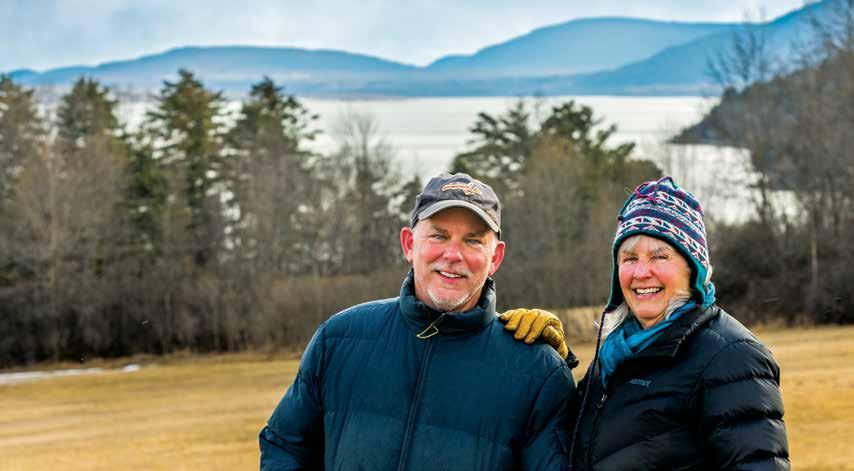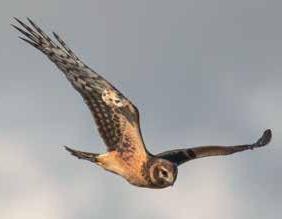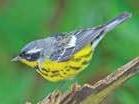

Goings On at Glenview Preserve update
Q&A With Stewardship & GIS Manager Becca Halter

The Adirondack Land Trust’s 238-acre Glenview Preserve, located along New York State Route 86 in Harrietstown, is best known for its stunning vista of Whiteface Mountain and the McKenzie Range. Because there is much more to the land than the view, we’re working on a public access plan to allow more people to experience it, including people who use wheelchairs, walkers, baby strollers, or want a shorter walk with gentler grades. This interview with our staff lead provides a project overview and update.
What’s special about this land?
For starters, the view! Beyond this, there are three unique habitats in close succession: open fields, a typical Adirondack northern hardwood forest and then the open boreal wetlands of Bloomingdale Bog. Each one feels so different with unique trees, plants, birds and critters. And I’m always surprised at the breadth of critters. Trail cameras have captured videos of moose, black bear, coyote, bobcat, fisher and many more. My best wildlife experience was on my very first visit, coming upon a bobcat as it jumped down from a tree!
Why provide public access?
The more time I spend at this site, the more I want other people to be able to enjoy it and connect with nature, not just catch a glimpse from a car window. Compared with many trail destinations in the Adirondacks, there are unique opportunities here to provide trails with limited grade (less than 5 percent) and offer views without having to hike to a mountaintop.
How is the preserve plan shaping up?
It’s going well! The design phase is wrapping up. We will be submitting various permits to ensure we are meeting regulatory requirements. A 16-space parking
continued on page 6
Photos: © Kathy Woughter (Glenview); Lisa J. Godfrey (Becca Halter) Becca HalterBOARD OF DIRECTORS
Stephen H. Burrington, Chair
David Henle, Vice Chair
Timothy Fritzinger, Treasurer
Anne C. Stuzin, Secretary
Elizabeth McLanahan, Executive Committee Member
David Brunner
Charles Canham, Ph.D.
Elizabeth Folwell
Barbara Glaser, Ed.D.
Lisa Guide
Heidi Kretser, Ph.D.
Brian T. Majeski
Joe Martens
Vinny McClelland
Amy McCune, Ph.D.
Catherine McGraw
Peter S. Paine, Jr.
William Paternotte
Holly Rippon-Butler
Robert J. Trainor
Julie Willis
Advisory Directors
Mike DiNunzio
Bill McKibben
Amy Vedder, Ph.D.
Chairs Emeriti
Lionel O. Barthold
James C. Dawson, Ph.D.
Harry Groome
Edward W. McNeil
Meredith M. Prime
Charles O. Svenson
NEXT GEN COUNCIL
Stephanie Campbell Adeline Clayton
Naishaly Vélez Galán
Evan Foster
Maya Fuller
Dan Galvin
Jess Grant
Lura Johnson
Brianna LaRose
Carlie Leary
Tanner LeCuyer
Abigail Omaña
Matt Plouffe
Cassandra Prenn-Vasilakis
Renee Seacor
Charlotte Staats
Madeleine Stuzin
Emma Ticknor
Thomas Wei
Brooke Wise
Brian Woods
2861 NYS Route 73
PO Box 130, Keene, NY 12942
(518) 576-2400
info@adirondacklandtrust.org
adirondacklandtrust.org
ADIRONDACK VISIONARY

SHEILA HUTT PLANS FOR A WILD FUTURE
As a 10-year-old Girl Scout in the 1950s, Sheila Hutt made her own bedroll by pinning together a blanket and a sheet to stay snug while camping near her hometown of Tupper Lake. She packed this bedroll for a troop outing to Heart Lake near Lake Placid. That trip was the first time she turned down Adirondack Loj Road and saw the panoramic view of the Adirondack High Peaks.
“I’d seen mountains and lakes at home, but this was special,” she remembers. “It’s an iconic view, and an Adirondack treasure.”
Sheila, turning 80, has spent decades seeking Adirondack gems. After learning to paddle on Heart Lake, she went on to hike alpine summits and cross-country ski from Tahawus in Newcomb to Lake Placid. Sheila married fellow Tupper Laker Jim Hutt, and they made their
way to New York City. They created a successful business building architectural models, but they dreamed of living among wild forests.
That opportunity came when they visited Blue Mountain Lake and met folks starting a local arts center. Sheila and Jim became the founding co-directors of the Adirondack Lakes Center for the Arts, roles they held for 11 years. They still live in Blue Mountain Lake, knowing that a close-knit community of creative, caring people is another jewel of the Adirondacks.
Now retired, Sheila and Jim enjoy bike rides, ski days, and kayak trips. They also volunteer with the Blue Mountain Lake Association, dedicating time to an annual roadside trash pickup and monitoring water quality on Blue Mountain Lake. “My philosophy is really to be a steward of this wilderness,” Sheila says. “I can’t do that alone. It takes all of us working together.”
Another way Sheila and Jim have given back is by supporting the Adirondack Land Trust for more than 30 years. Sheila further committed to caring for the Adirondacks by including the land trust in her estate plans.
Last summer, Sheila was delighted to hear that the treasured view that awed her as a child was protected forever by the land trust’s purchase of 187 acres at the corner of Adirondack Loj Road and State Route 73.
“I tend to think in generations,” Sheila says. “I want younger people to have the same kind of experience I had growing up. Whatever we can do to help to preserve that, I’m for, and I would like to encourage other people to be for that too.” n
Support the Adirondacks—Now and Forever
When the Adirondack Land Trust makes a promise to protect land, that promise lasts forever. This means planning for a future we’ll never know. That’s why we recognize individuals who include the Adirondack Land Trust in their estate plans as an Adirondack Visionary. Their legacy gifts ensure Adirondack lands, waters, farms, and wild places stay healthy for generations.
For more information on how to make a planned gift to the Adirondack Land Trust through your will, living trust, life insurance policy, stocks, real estate, or other estate plans, please contact Associate Director of Philanthropy Kimberly Corwin-Gray at kimberly.gray@adirondacklandtrust.org.

Enduring Commitment to Land

Conservation and Stewardship in the Champlain Valley
In a narrow bay northwest of the Lake Champlain Bridge in Crown Point, mountains swoop down to meet water with such drama that it reminds Sadie Mosley of a Scandinavian fjord. Her husband, Neil, agrees, as they look from their kitchen window toward the bridge that connects New York with Vermont. Their firsthand knowledge of fjords comes from living in Norway, which is where they were in 2015 when Neil found the real estate listing online for what is now their year-round home in Moriah.
Their 50-acre tract features open fields that provide the only view of Lake Champlain from State Route 9 between Westport and Port Henry. Drivers regularly pull over to snap photos of the bucolic scene. Thanks to a permanent conservation agreement between the landowners and the Adirondack Land Trust, everyone who loves this view from the road can rest assured that it will be here forever.
first had to “pass” her test to make sure that their values and intentions aligned with hers.
The Mosleys sought a farming lifestyle as a retirement goal, and after living abroad for many years, wanted to settle in a place that would be a draw for friends and family to visit so they could stay put. This property checked multiple boxes for them. Their interests passed muster with Karen.
Thanks to a permanent conservation agreement between the landowners and the Adirondack Land Trust, everyone who loves this view from the road can rest assured that it will be here forever.
The Mosleys are carrying forward a conservation arrangement put into place two decades ago by previous landowner Karen Lawaetz. In 2003, Karen sent a handwritten note to Adirondack Land Trust Executive Director Mike Carr that read, “You are doing a very great service to future generations as well as today.”
Karen’s connections to the land ran as deep as the deepest fjord and she wouldn’t sell to just anyone. Sadie and Neil
Today, in accordance with no-till farming practices, a neighbor hays part of their field and pastures half a dozen heifers, which helps to keep the soil healthy. Broiler chickens aerate the soil and disperse nutrients left behind by the cows. The Mosleys are experimenting with growing Cascade, Chinook and Brewer’s Gold varieties of hops and are interested in getting them into the hands of local brewers. In a six-acre plot, they manage grasses and flowers for honeybees, butterflies, moths, and other pollinating insects.
Sadie and Neil are demonstrating what Karen knew all along: private land conservation requires good stewardship and, in turn, contributes to a greater good. This is especially true in the Champlain Valley where there are fewer acres protected compared to the rest of the Adirondack Park and farmland is as defining a feature of the landscape as the lake.
n







Mt. Colden
Mt. Marcy
Algonquin Peak
Wright Peak
Avalanche Pass
Wallface Mtn.
Indian Pass
 Clockwise from upper left: Northern harrier, by Derek Rogers; botanists Steve Young and Ray Curran comparing notes with colleagues, by Olivia Dwyer; map, by Becca Halter; golden crowned kinglet, by Larry Master; bunchberry, by Connie Prickett; fisher, by Derek Rogers; botanist Laura Lehtonen, by Connie Prickett. Below: High Peaks scenic vista illustration, by Thatcher Hogan, author of the forthcoming book “Mapping the Adirondacks.” Opposite: magnolia warbler, by Larry Master.
Clockwise from upper left: Northern harrier, by Derek Rogers; botanists Steve Young and Ray Curran comparing notes with colleagues, by Olivia Dwyer; map, by Becca Halter; golden crowned kinglet, by Larry Master; bunchberry, by Connie Prickett; fisher, by Derek Rogers; botanist Laura Lehtonen, by Connie Prickett. Below: High Peaks scenic vista illustration, by Thatcher Hogan, author of the forthcoming book “Mapping the Adirondacks.” Opposite: magnolia warbler, by Larry Master.
COMMUNITY INVITED TO BRAINSTORM A PRESERVE NAME
THE NATURE OF A NAME
Aquartet of botanists stands at the edge of an open field at the corner of New York State Route 73 and Adirondack Loj Road outside Lake Placid. They pass around green stalks topped with yellow blooms, using handheld magnifying lenses to study leaf veins and flower plumes.
“Solidago canadensis ?” one asks.
“I think Solidago ruigosa,” says another, pointing to the fine stem hairs that indicate wrinkleleaf goldenrod. They nod in agreement and move three feet to crouch and study a plant with purple flowers. “We don’t go very fast,” says Ray Curran, a retired botanist who helped to coordinate the outing.
In the next few hours, they move from the field to surrounding forests, glimpsing the Ausable River through tall pines. They identify 97 plant species, including Canadian bunchberry, Timothy grass, and New York fern on the 187-acre parcel added to the Adirondack Land Trust’s preserves portfolio in August 2023.
A view that grounds and unites
Looking across the preserve’s open field toward the High Peaks Wilderness is a grounding experience. A roll call of summit names—Algonquin, Wright, Colden— transforms nature’s grandeur into something familiar and unifying. Get to know the view in the sketch below.
What’s in a name?
Learning about names associated with this land informs how we care for it today and plays a factor in how we plan for future public access. As you read about what we’ve been learning and reflect on your own connection to the iconic vista at this site, perhaps an idea will come to mind for giving this preserve a name. If so, we invite you to participate in a community brainstorming effort to find a name that captures the essence of the land.
Birds and critters
Nye Mtn.

Adirondack Land Trust Stewardship Manager Derek Rogers is rarely seen without binoculars and a camera. So far he has identified 63 bird species here including golden-crowned kinglet, cedar waxwing, northern harrier. Motion-sensor trail cameras have captured video of Eastern coyote, white-tailed deer, and other critters. On a routine stewardship visit, Derek was quick to snap a photo of a fisher hunkered down at the forest edge. Identifying wildlife by their names shifts the land from being a generic parcel to a life-sustaining place.
Past uses
When Ron and Beth Edgley leased the field from 1983 to 2012 to grow organic seed potatoes, it was called Windy Mountain Farm. In the mid-1800s, a southwestern corner of the parcel was owned by John Briggs, of Albany, as part of Gerrit Smith’s efforts to enfranchise Black men. Through research we will learn more about stories rooted in historic uses of the land.
Next steps
As a friendly reminder, the preserve is not open for public access at this time. The view is always open for all to enjoy from the roadside pull-off. Learn how to share your naming ideas online at adirondacklandtrust.org.
Sawtooth Range Street Mtn.

STAFF
Mike Carr, Executive Director
Kimberly Corwin-Gray, Associate Director of Philanthropy
Olivia Dwyer, Communications Specialist
Becca Halter, Stewardship & GIS Manager
Chris Jage, Conservation Program Director
Connie Prickett, Director of Communications
Derek Rogers, Stewardship Manager
Susie Runyon, Finance & Operations Manager
Joe Scrimenti, Office Administrator
Megan Stevenson, Land Protection Manager
Mary Thill, Grants Manager
Aaron Thomas, Farmland & Stewardship Specialist
Nancy Van Wie, Director of Philanthropy
Kathy Woughter, Philanthropy & Outreach Coordinator



Q&A With Stewardship & GIS Manager Becca Halter
area will welcome visitors to a trailhead with an informational kiosk, a small pavilion with a vegetated roof that will help the structure blend into the scenery, and restrooms. The 2.25mile trail system will have two upper loops through open meadows and forests, plus a spur trail across a stream to an overlook of the bog.
What have you learned from community members?
Through two community workshops, a survey, and stakeholder meetings, we heard a lot of excitement about the project, as well as some safety and viewshed concerns. The design prioritizes safe access from Route 86, includes vegetative screening around the parking area, and reflects the expertise of professionals with experience in accessible trails.
Executive Director Mike Carr has been selected to serve on the Land Trust Alliance’s New York Advisory Council, along with 15 land trust executives from around the state. The LTA’s New York program serves as a leader, convener, and technical assistance provider to more than 90 nonprofit land trusts across the state, and with the Advisory Council supports their efforts to preserve farmland, forests, rivers, mountains, lakes, trails, gardens, parks and preserves.
Conservation Program Director Chris Jage was appointed to the Land Trust Accreditation Commission in January 2024. During his three-year appointment, Chris will serve on the 19-member board that reviews and approves applications from U.S. land trusts seeking accreditation for meeting the highest standards for conservation. This experience will provide an opportunity to learn about emerging and effective land trust practices.
Joey Willman, a University of Wisconsin senior, has been selected as this year’s Intern for the Future of the Adirondacks. With a dual major in Forest and Wildlife Ecology and Cartography Geographic Information Systems, as well as experience as a naturalist and field and lab technician, Joey brings valuable skills to advance key projects focused on land management and stewardship. He looks forward to gaining more professional experience in the field of conservation and we look forward to working with him.
Continued from page 1
What kind of visitation do you anticipate?
When the trail system is complete, the proximity of this preserve to Saranac Lake will make it a place for community members to go for a walk during lunch or after work. Young children, their parents and grandparents, or caregivers and the people they assist, will spend time together for fresh air and exercise. Birdwatchers will enjoy the habitat variety. While others will enjoy the view from the parking area, snap photos, and leave feeling more connected to the landscape.
What’s the timeline for this work?
We anticipate the project to be completed in the next one to three years. Please visit adirondacklandtrust.org for current information. n

CONNECT WITH THE ADIRONDACK LAND TRUST!
Visit adirondacklandtrust.org to register for these free activities.



GARLIC MUSTARD PULL
Westport | Saturday, May 4, 9 a.m. to 12 p.m.
Help native plants maintain an upper hand by eradicating invasive garlic mustard that threatens to crowd them out. If time permits, look for spring wildflowers and hike 0.7 miles to a beautiful view.
PORCH SOCIAL, HOSTED BY THE ADIRONDACK LAND TRUST’S NEXT GEN COUNCIL
Keene | Thursday, June 27, 4:30 to 6:30 p.m.
Enjoy an agenda-free, casual gathering on our office porch for young professionals, interns, and seasonal staff in their 20s and 30s with a passion for the Adirondacks.
LEARN 10 TREES
Lake Placid | Saturday, June 29, 1:00 to 4:30 p.m.
Join botanist Dan Spada to learn how to identify 10 trees, focusing on common Adirondack species. Offered in partnership with the New York Flora Association.
MINDFULNESS MEDITATION
Lake Placid | Sunday, July 28, 8:00 to 9:30 a.m.
Start your day with a peaceful, guided meditation on trails through grassland and along the banks of the Ausable River led by the Adirondack Land Trust’s Joe Scrimenti.
PROFESSIONAL TRAIL BUILDING PERSPECTIVE AND INSIGHT
Cobble Hill, Lake Placid | Saturday, September 14
Get the dirt on recent trail upgrades with professional trail builders Adeline Clayton and Charlotte Staats, members of the Adirondack Land Trust’s Next Gen Council. They will share their expertise on a hike to Cobble Hill, where the land trust has been working with community stakeholders to make a popular trail safer, more enjoyable, and environmentally sustainable.








